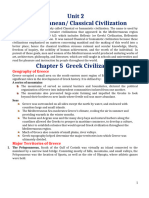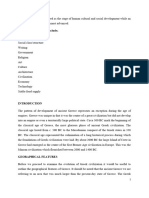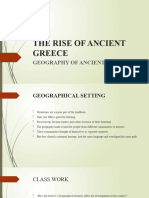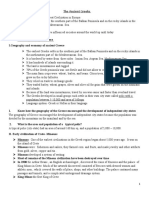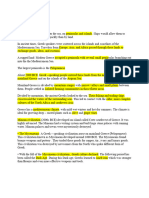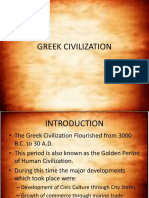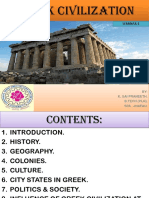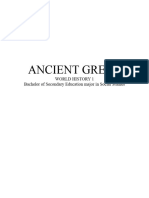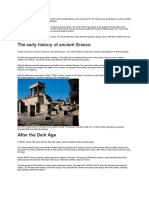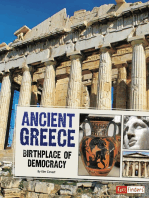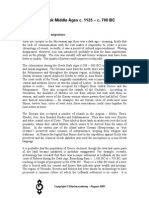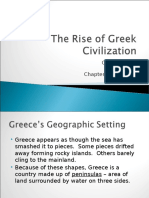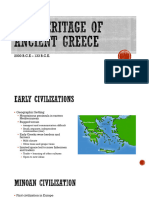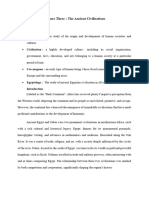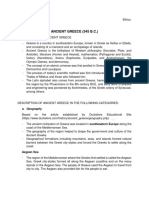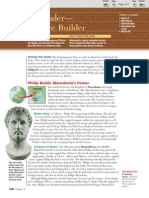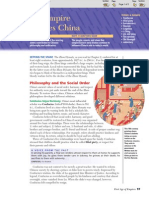Chapter 5 Section 1
Chapter 5 Section 1
Uploaded by
api-233607134Copyright:
Available Formats
Chapter 5 Section 1
Chapter 5 Section 1
Uploaded by
api-233607134Original Title
Copyright
Available Formats
Share this document
Did you find this document useful?
Is this content inappropriate?
Copyright:
Available Formats
Chapter 5 Section 1
Chapter 5 Section 1
Uploaded by
api-233607134Copyright:
Available Formats
111-114-0205s1
10/11/02
3:36 PM
Page 111
Page 1 of 4
Cultures of the
Mountains and the Sea
MAIN IDEA
WHY IT MATTERS NOW
Physical geography caused separate
groups of Greek-speaking peoples to
develop isolated societies.
The seeds of much of Western
cultural heritage were planted during
this time period.
TERMS & NAMES
Mycenaeans
Trojan War
Dorians
Homer
epics
myths
SETTING THE STAGE In ancient times, Greece was not a united country. It was a
collection of separate lands where Greek-speaking people lived. By 2000 B.C., the
Minoans lived on the large Greek island of Crete. The Minoans created an elegant
civilization that had great power in the Mediterranean world. At the same time, IndoEuropean peoples migrated from the plains along the Black Sea and Anatolia. The
Indo-Europeans settled in mainland Greece. Seaborne commercial networks spread
ideas as well as resources throughout the eastern Mediterranean.
Vocabulary
peninsula: a piece
of land that extends
into a body of water
and is connected to
the mainland
A. Possible
Answers The closeness of the sea promoted trade between
city-states and surrounding societies.
The mountains isolated the valleys. This
fostered independence and made it
more difficult to
establish central
control.
THINK THROUGH HISTORY
A. Analyzing
Causes In what
ways did Greeces
location by the sea
and its mountainous
land affect the development of its society?
Geography Shapes Greek Life
Ancient Greece consisted mainly of a mountainous peninsula jutting out into the
Mediterranean Sea. It also included approximately 1,400 islands in the Aegean
(ih JEE uhn) and Ionian (eye OH nee uhn) seas. Lands on the western coast of
Anatolia were also part of ancient Greece. (See the map on page 112.) The regions
physical geography directly shaped Greek traditions and customs.
The Sea The sea shaped Greek civilization just as rivers shaped the ancient civilizations
of Egypt, the Fertile Crescent, India, and China. In one sense, the Greeks did not live on
a land but around a sea. Greeks rarely traveled more than 85 miles to reach the coastline.
The Aegean Sea, the Ionian Sea, and the neighboring Black Sea were important
transportation routes for the Greek people. These liquid highways
linked most parts of Greece. As the Greeks became skilled sailors,
sea travel also connected Greece with other societies. Sea travel
and trade were also important because Greece itself was poor
in natural resources. Greece lacked timber, precious metals,
and usable farmland.
Nestled at the base
of a mountain
range, this coastal
Greek city has a
rugged shoreline.
The Land Rugged mountains covered about three-fourths
of ancient Greece. Mountains divided the land into a number of different regions. The mountain chains ran mainly
from northwest to southeast along the Balkan peninsula.
They significantly influenced Greek political life. Unlike the
Egyptians or the Chinese, it was difficult to unite the ancient
Greeks under a single government. Greece developed small, independent communities within each little valley and its surrounding
mountains. Most Greeks gave their loyalty to these local communities.
In ancient times, the uneven terrain also made land transportation
difficult. Early Greek roads were little more than dirt paths. For example, the city-state of Sparta was only about 60 miles from Olympia, the
site of the Olympic Games. Yet it took Spartans almost seven days
to travel that distance.
Much of the land itself was stony and only a small part of it
approximately 20 percentwas arable, or suitable for farming.
111
111-114-0205s1
10/11/02
3:36 PM
Page 112
Page 2 of 4
Black Sea
Greece, 600 B.C.
Byzantium
Greek homeland
Areas colonized by Greeks
Trade routes
Troy
GREECE
100 Miles
Gul
f of
200 Kilometers
WEST
WEST
38N
Cor
inth
EAST
EAST
Athens
Corinth
Mycenae
Tiryns
Sea
ean
Ionian
Sea
Topography
elevation (in feet)
Aeg
Corcyra
Elevation profile of Greece at 38N
5000
4000
3000
2000
1000
0
West
Athens
East
PELOPONNESUS
Modern Athens
Sparta
Phaselis
20E
28E
24E
Mediterranean
G E O G R A P H Y S K I L L B U I L D E R : Interpreting Maps
1. Movement Based on the map, how did Greek traders conduct most of their trade?
2. Human-Environment Interaction How might the topography or surface features of
Greece have affected communications among early Greek settlements?
Tiny but fertile valleys covered about one-fourth of Greece. The
small streams that watered these valleys were not suitable for
large-scale irrigation projects.
With so little fertile farmland or fresh water for irrigation,
Greece was never able to support a large population. It is estimated that no more than a few million people lived in ancient
Greece at any given time. Even this small population couldnt expect the land to support a life of luxury. As a result, the Greeks based their diet on basic staple crops such
as grains, grapes, and olives. A desire for more living space, grassland for raising livestock, and adequate farmland may have been factors that motivated the Greeks to
seek new sites for colonies.
The Climate Climate was the third important environmental influence on Greek
civilization. Greece has a varied climate with temperatures averaging 48 degrees
Fahrenheit in the winter and 80 degrees Fahrenheit in the summer. In ancient
times, these moderate temperatures supported an outdoor life for many Greek citizens. Men spent much of their leisure time at outdoor public events. They met often
to discuss public issues, exchange news, and take an active part in civic life.
Mycenaean Civilization Develops
As Chapter 3 explained, a large wave of Indo-Europeans migrated from the Eurasian
steppes to Europe, India, and Southwest Asia. Some of these people who settled on the
Greek mainland around 2000 B.C. were later known as Mycenaeans. The name came
from their leading city, Mycenae (my SEE nee).
Mycenae was located on a steep, rocky ridge and surrounded by a protective wall up
to 20 feet thick. The fortified city of Mycenae could withstand almost any attack. From
112 Chapter 5
Sea
111-114-0205s1
10/11/02
3:36 PM
Page 113
Page 3 of 4
Mycenae, a warrior-king ruled the surrounding villages and farms. Similar Mycenaean
palace-forts dotted the southern part of Greece. Influential and militaristic rulers controlled the Mycenaean communities in towns such as Tiryns and Athens. These kings
dominated Greece from about 1600 to 1200 B.C.
Culture and Trade The nobles who lived within the fortresses enjoyed a life of sur-
Background
On the Aegean island
of Thera, near Crete,
a volcano erupted
around 1470 B.C. This
event may have
helped to bring about
the end of Minoan
civilization.
Vocabulary
Western civilization:
the culture that
evolved in Europe and
spread to the
Americas
prising splendor. They feasted in great halls 35 feet wide and 50 feet long. During banquets, the firelight from a huge circular hearth glittered on a dazzling variety of gold
pitchers and silver cups. When the royal Mycenaeans died, they were buried with their
richest treasures. Warrior-kings won their enormous wealth by controlling local production and commercial trade. They also led their armies in search of plunder. However,
few other Mycenaeans had the wealth of the warrior-kings. Wealthy kings of the Bronze
Age (20001100 B.C.) wielded bronze weapons and drank from cups of gold. The common people used tools made from less expensive materials such as stone and wood.
Most were farmers, but others worked as weavers, goat herders, or stonemasons.
The warrior-kings of Mycenae also invaded Crete. The Minoan civilization had flourished on Crete for 600 years. The civilization ended abruptly and mysteriously in 1400
B.C. The Mycenaean invasions prevented the Minoans from rebuilding. However, the
Mycenaeans preserved elements of Minoan culture by making it part of their own lives.
From their contact with the Minoans, the Mycenaeans saw the value of seaborne
trade. Mycenaean traders sailed to islands in the Aegean, coastal towns of Anatolia, and
to cities in Syria, Egypt, Italy, and Crete. The Minoans influenced Mycenaean culture in
other ways as well. The Mycenaeans adapted the Minoan writing system to the Greek
language and decorated vases with Minoan designs. Their legacy survived in the form of
legends. These legends later formed the core of Greek religious practice, art, politics, and
literature. Western civilization has roots in these early Greek civilizations.
Greek stories tell of
their armys capture
of the legendary
city of Troy. Some
scholars think that
the hollow wooden
horse of Western
literature may
actually have been
a gigantic siege
engine or battering
ram.
The Trojan War About 1200 B.C. the Mycenaean kings
fought a ten-year war against Troy, an independent trading
city located in Anatolia. According to legend, a Greek army
besieged and destroyed Troy because a Trojan youth had kidnapped Helen, the beautiful wife of a Greek king.
For many years, historians thought that the legendary stories
told of the Trojan War were totally fictional. Then around 1870,
a German archaeologist, Heinrich Schliemann, began excavating
a hill in northwestern Turkey. He found the remains of nine layers of city life, one of which may date from this time period. His
discoveries suggest that the stories of the Trojan War may have
been based on real cities, people, and events.
In 1988, another German historian, Manfred Korfmann,
excavated an ancient maritime cemetery near the hill believed to
be the site of ancient Troy. Although some scholars disagree,
Korfmann believes the Trojan War was a struggle for control of a
crucial waterway in the Aegean Sea. In any event, the attack on
Troy was probably one of the last campaigns of the Mycenaeans.
Greek Culture Declines Under the Dorians
Not long after the Trojan War, Mycenaean civilization collapsed. Around 1200 B.C., sea
raiders attacked and burned palace after palace. At Mycenae, a layer of ashes from a
terrible fire covered the entire palace site. According to tradition, a new group of people, the Dorians (DAWR ee uhnz), moved into this war-torn countryside. The Dorians
spoke a dialect of Greek and were distant relatives of the Bronze Age Greeks.
The Dorians were far less advanced than the Mycenaean Greeks. The centralized
economy collapsed and trade eventually came to a standstill with their arrival. Most
Classical Greece 113
111-114-0205s1
10/11/02
3:36 PM
Page 114
Page 4 of 4
important to historians, Greeks appear to have temporarily forgotten the art of writing
during the Dorian Age. No written record exists from the 400-year period between
1150 and 750 B.C. Without written records, little is known about this period of decline.
Epics of Homer Lacking writing, the Greeks of this time learned about the Trojan
War through the spoken word. Their greatest storyteller, according to Greek tradition,
was a blind man named Homer. Little is known of his personal life. Some historians
believe Homer composed his epics, narrative poems celebrating heroic deeds,
between 750 and 700 B.C. The Trojan War forms the backdrop for Homers two great
epic poems, The Iliad and The Odyssey.
The heroes of The Iliad are warriors: the fierce Greek, Achilles (uh KIHL eez), and
the courageous and noble Hector of Troy. In the following dramatic excerpt, Hectors
wife begs him not to fight Achilles:
This is a marble
sculpture of
Polyphemus, a
cyclops, or oneeyed monster, in
Homers The
Odyssey.
A V O I C E F R O M T H E PA S T
O Hector, your courage will be your destruction; and you have no pity on your little
son or on me, who will soon be your widow. . . if I lose you, it would be better for me
to die. . . .
Then tall Hector. . . answered, Wife, I too have thought upon all this. But I would
feel deep shame if like a coward I stayed away from battle. All my life I have learned
to be brave and to fight always in the front ranks of the Trojans, winning glory for
myself. . . .
THINK THROUGH HISTORY
B. Making
Inferences Why
was the oral tradition
during the Dorian Age
important to later
historians?
B. Possible
Answers
Archaeologists have
dug up artworks,
tools, weapons, and
other objects from
this period. Historians
use the myths and
legends that were a
part of this oral tradition to interpret these
finds.
HOMER, The Iliad
Hectors response to his wife gives insight into the Greek heroic ideal of
arete (ar uh TAY), meaning virtue and excellence. A Greek could display this
ideal on the battlefield, in combat, or in athletic contests.
Homers other epic, The Odyssey, concerns the adventures of Odysseus
(oh DIH see uhs). Odysseus uses his wits and trickery to defeat the
Trojans. Much of this epic is set after the war. It concerns his ten-year
journey home and the strange and mysterious lands Odysseus visits along
the way.
Greeks Create Myths The Greeks developed a rich set of myths, or tradi-
tional stories, about their gods. Through these myths, the Greeks sought to
understand the mysteries of nature and the power of human passions. Myths
explained the changing of the seasons, for example.
Greeks attributed human qualities, such as love, hate, and jealousy, to their
gods. The gods quarreled and competed with each other constantly. However,
unlike humans, the gods lived forever. Zeus, the ruler of the gods, lived on Mount
Olympus with his wife, Hera. Hera was often jealous of Zeus relationships with other
women. Athena, goddess of wisdom, was Zeus daughter and his favorite child. The
Greeks thought of Athena as the guardian of cities, especially of Athens, which was
named in her honor. You will learn about Athens and other cities in Section 2.
Section 1 Assessment
1. TERMS & NAMES
Identify
Mycenaeans
Trojan War
Dorians
Homer
epics
myths
2. TAKING NOTES
Re-create the graph below on
your paper and fill in examples of
how geography affected early
Greek civilization.
Geographic Feature
sea
land
climate
114 Chapter 5
3. DRAWING CONCLUSIONS
Effects
Why did the lack of writing
represent a setback to the
development of Greek civilization?
THINK ABOUT
Minoan and Mycenaean
accomplishments
uses of writing
other forms of communication
4. ANALYZING THEMES
Cultural Interaction Why do
you think that early Greek epics
and myths are so well known and
studied in todays society?
THINK ABOUT
arete
Greek ideals compared to ideals
in todays world
early Greeks purpose of
storytelling
You might also like
- 6.1, The Rise of Greek CivilizationDocument18 pages6.1, The Rise of Greek CivilizationLeon Guinto100% (1)
- Reading GeogshapesgreeklifeDocument1 pageReading Geogshapesgreeklifeapi-240966525No ratings yet
- The History of Europe in Bite-sized ChunksFrom EverandThe History of Europe in Bite-sized ChunksRating: 3.5 out of 5 stars3.5/5 (3)
- Section 11 Arbitration ActDocument41 pagesSection 11 Arbitration ActShivansh AryaNo ratings yet
- Glycerinization of Foliages For Dry Flower Products MakingDocument6 pagesGlycerinization of Foliages For Dry Flower Products MakingAndreaNo ratings yet
- Hi Enmanuel!: Order Confirmation 15T8080Document2 pagesHi Enmanuel!: Order Confirmation 15T8080enmanuel dipugliaNo ratings yet
- Ancient Unit 2 - Ch. 5&6Document33 pagesAncient Unit 2 - Ch. 5&6Daniel AsmareNo ratings yet
- Greek CivilizationDocument82 pagesGreek CivilizationNehmmuel FerrerNo ratings yet
- Sem_1st_Ancient Greece and Roman Empire-IDocument21 pagesSem_1st_Ancient Greece and Roman Empire-Iraghavhans62No ratings yet
- Greek ArchitectureDocument35 pagesGreek Architecturepriya ramanathanNo ratings yet
- G-8 Greek CivilizationDocument25 pagesG-8 Greek CivilizationAbigail Ranque-DiaNo ratings yet
- Greek Civilization Note 2Document18 pagesGreek Civilization Note 2solomonolukanni444No ratings yet
- Ancient GreeceDocument8 pagesAncient GreeceRamita UdayashankarNo ratings yet
- EARLY GREEK CIVILIZATION Final Study ExamDocument16 pagesEARLY GREEK CIVILIZATION Final Study Exammelissacephas25No ratings yet
- Greek Civilization: Reported By: Aaron Masaganda Hist 02 (World History)Document83 pagesGreek Civilization: Reported By: Aaron Masaganda Hist 02 (World History)Arvin Jonathan Moyon RetuyaNo ratings yet
- Greek Civilization and EmpireDocument19 pagesGreek Civilization and EmpirePaul SissmanNo ratings yet
- Prefi - worldhistory-WPS OfficeDocument14 pagesPrefi - worldhistory-WPS OfficeRuth SordillaNo ratings yet
- Ancient Greece, Pomeroy Et Al.: Reading Notes Week OneDocument14 pagesAncient Greece, Pomeroy Et Al.: Reading Notes Week OneLouis Mainwaring FosterNo ratings yet
- Cultures of The Mountains and The Sea: Geography Shapes Greek LifeDocument4 pagesCultures of The Mountains and The Sea: Geography Shapes Greek LifeCarmela AbergosNo ratings yet
- World History Unit 1 "Early People of The Aegean"Document13 pagesWorld History Unit 1 "Early People of The Aegean"William Cox100% (1)
- Unit 7. Greek CivilisationDocument106 pagesUnit 7. Greek Civilisationy6zxep1pdaNo ratings yet
- The Rise of Ancient GreeceDocument8 pagesThe Rise of Ancient Greecechimwemwemwanza48No ratings yet
- Cap 6-The Ancient GreeksDocument4 pagesCap 6-The Ancient GreeksCanioNo ratings yet
- The Greeks: History of an Ancient Advanced Culture | Life in Ancient GreeceFrom EverandThe Greeks: History of an Ancient Advanced Culture | Life in Ancient GreeceNo ratings yet
- Aegean ArchitectureDocument27 pagesAegean Architecturenusantara knowledge50% (2)
- Geography TestDocument7 pagesGeography Testnoora.rami48No ratings yet
- Greece 8 History Architecture v1 m56577569830517603Document36 pagesGreece 8 History Architecture v1 m56577569830517603Camila GregoskiNo ratings yet
- The Cycladic CivilizationDocument15 pagesThe Cycladic CivilizationAnna CaunNo ratings yet
- A History of Science and Technology BCE-before Common Era, Corresponds To Before Christ CE - Common Era, Corresponds To Anno DominiDocument3 pagesA History of Science and Technology BCE-before Common Era, Corresponds To Before Christ CE - Common Era, Corresponds To Anno Dominilance cunananNo ratings yet
- Daniel1948 - The Dorian Invasion The SettingDocument5 pagesDaniel1948 - The Dorian Invasion The SettinghioniamNo ratings yet
- GREEKDocument24 pagesGREEKAdrish NaskarNo ratings yet
- Module C-STSDocument7 pagesModule C-STSAndrina CabreraNo ratings yet
- Adwoa Sikafuturo Boateng History Homework Ancient GreeceDocument3 pagesAdwoa Sikafuturo Boateng History Homework Ancient GreeceCynthia Boateng100% (1)
- Greek Civilization: Seminar-1Document26 pagesGreek Civilization: Seminar-1Ar Ayoushika AbrolNo ratings yet
- Ancient GreekDocument6 pagesAncient GreekRenzie MacariolaNo ratings yet
- World HisDocument5 pagesWorld HisRaul MartinNo ratings yet
- Comments and QuestionsDocument1 pageComments and Questions秦愛春No ratings yet
- Ancient Greece (1750 - 133) : B.C. B.CDocument44 pagesAncient Greece (1750 - 133) : B.C. B.CMargaretNo ratings yet
- Middle KingdomDocument13 pagesMiddle Kingdomapi-252729009No ratings yet
- Ancient Greece MapDocument3 pagesAncient Greece MapAlex AndersonNo ratings yet
- Dgtal PathwayDocument7 pagesDgtal PathwayKelvin WinataNo ratings yet
- The Early History of Ancient GreeceDocument2 pagesThe Early History of Ancient Greecegebrerufael hailayNo ratings yet
- A Overview of Greek HistoryDocument19 pagesA Overview of Greek Historynetname1100% (1)
- Architectural History of Egyptian CivilisationDocument8 pagesArchitectural History of Egyptian CivilisationNameerah Tariq Tariq SaeedNo ratings yet
- Seafering TradersDocument13 pagesSeafering TradersJulliette BatistaNo ratings yet
- The Greek Middle Ages C. 1125 - C. 700 BCDocument8 pagesThe Greek Middle Ages C. 1125 - C. 700 BCpanagiotis-georgas-2063No ratings yet
- 6.1, The Rise of Greek CivilizationDocument18 pages6.1, The Rise of Greek CivilizationLeon GuintoNo ratings yet
- Ancient Greek CivilizationDocument5 pagesAncient Greek CivilizationKen Galia UmaliNo ratings yet
- Greek Civilization and Culture: Ancient GreeceDocument64 pagesGreek Civilization and Culture: Ancient GreeceKai GrenadeNo ratings yet
- 1 The Heritage of Ancient GreeceDocument14 pages1 The Heritage of Ancient Greeceapi-597228084No ratings yet
- Ancient Greece (History) Short PrintDocument6 pagesAncient Greece (History) Short Printmariieya03No ratings yet
- Lesson 3Document5 pagesLesson 3pyroarchon141No ratings yet
- The Ancient Greece?Document14 pagesThe Ancient Greece?Alfred EsmillaNo ratings yet
- Week 3 - OutlineDocument7 pagesWeek 3 - OutlineUmay PelitNo ratings yet
- Slave Society in Ancient GreeceDocument35 pagesSlave Society in Ancient GreeceAshtami KhatriNo ratings yet
- Greece GeographyDocument2 pagesGreece Geographymariieya03No ratings yet
- World history u2Document4 pagesWorld history u2yasmim.januarioNo ratings yet
- 2 Final Copy Grudgeball Honors World Hitory MidtermDocument21 pages2 Final Copy Grudgeball Honors World Hitory Midtermapi-233607134No ratings yet
- Russians Adapt Byzantine Culture: Both Slavic and GreekDocument5 pagesRussians Adapt Byzantine Culture: Both Slavic and Greekapi-233607134No ratings yet
- Chapter 5 Section 4Document4 pagesChapter 5 Section 4api-233607134No ratings yet
- CHP 6 Section 1Document5 pagesCHP 6 Section 1api-233607134No ratings yet
- Chapter 5 Section 3Document8 pagesChapter 5 Section 3api-233607134No ratings yet
- Chapter 4 Section 4Document5 pagesChapter 4 Section 4api-233607134No ratings yet
- Chapter 4 Section 2Document4 pagesChapter 4 Section 2api-233607134No ratings yet
- Supplies 7th and 8th Grade SsDocument1 pageSupplies 7th and 8th Grade Ssapi-233607134No ratings yet
- UC 8th Edition Ejercicios y SolucionesDocument13 pagesUC 8th Edition Ejercicios y SolucionesMarcelo RodríguezNo ratings yet
- Henry Williams: Script For Introductory MonologueDocument2 pagesHenry Williams: Script For Introductory MonologueCynthia CarolineNo ratings yet
- Local Conceptual Nursing Models ONLINEDocument20 pagesLocal Conceptual Nursing Models ONLINERia Shan Inochi RelamidaNo ratings yet
- Cook PDFDocument43 pagesCook PDFGouri BhosaleNo ratings yet
- Cover LetterDocument1 pageCover Letterapi-458211409No ratings yet
- Welding-Process 222Document63 pagesWelding-Process 222Jasm OmranNo ratings yet
- Chapter 3 - Hiring Ethical PeopleDocument27 pagesChapter 3 - Hiring Ethical PeopleLiza MaryNo ratings yet
- Simoclad Instruction ManualDocument56 pagesSimoclad Instruction Manualbeto.vergar9No ratings yet
- Saint James Infirmary BluesDocument3 pagesSaint James Infirmary BluesGuyMcgowan100% (1)
- Bank 2020 Big Data WhitepaperDocument70 pagesBank 2020 Big Data WhitepaperPriyank PaliwalNo ratings yet
- Modern - Family.s06e07.hdtv.x264 Killers.Document47 pagesModern - Family.s06e07.hdtv.x264 Killers.Caesario TanumihardjaNo ratings yet
- 34 ArticleText 73 1 10 20191123Document7 pages34 ArticleText 73 1 10 20191123Heart BrokenNo ratings yet
- Naukri KapilMuniChoudhary (6y 0m)Document2 pagesNaukri KapilMuniChoudhary (6y 0m)dellindiaNo ratings yet
- CHAPTER 5: Microsoft Excel Basics: ObjectivesDocument26 pagesCHAPTER 5: Microsoft Excel Basics: ObjectivesDiana EngalladoNo ratings yet
- IRR of RA 9285Document42 pagesIRR of RA 9285Patrick Steven Sy100% (2)
- The Timeline of Media Development: PRE-INDUSTRIAL AGE (Before 1700s)Document7 pagesThe Timeline of Media Development: PRE-INDUSTRIAL AGE (Before 1700s)希LimeNo ratings yet
- Class 2 - Computer - SVHDocument12 pagesClass 2 - Computer - SVHBashir Ahmed SharifiNo ratings yet
- Disaster Recovery For SAP HANADocument2 pagesDisaster Recovery For SAP HANAHasan ShahriarNo ratings yet
- IP (Power Plant Building)Document26 pagesIP (Power Plant Building)Josue Carubio Ricalde Jr.No ratings yet
- Practical Lab # 6. Measurement of Drag and Lift of An Aerofoil at Different Angles of AttackDocument7 pagesPractical Lab # 6. Measurement of Drag and Lift of An Aerofoil at Different Angles of Attackamanuelfitsum589No ratings yet
- Pharmaceutical Marketing Cialis CaseDocument2 pagesPharmaceutical Marketing Cialis CaseTeddy BuriéNo ratings yet
- English As A Global LanguageDocument13 pagesEnglish As A Global LanguageChiaraNo ratings yet
- Eight Habits 01Document25 pagesEight Habits 01Lara Grace M. CunananNo ratings yet
- PTR Form For East Delhi Municipal Corporation 2014-15Document6 pagesPTR Form For East Delhi Municipal Corporation 2014-15rasiya49No ratings yet
- Asexual Reproduction Mitosis and Meiosis Study GuideDocument3 pagesAsexual Reproduction Mitosis and Meiosis Study Guideapi-299996815No ratings yet
- Review Aquaman 2018 Movie For WritingDocument2 pagesReview Aquaman 2018 Movie For WritingMella AndrianiThmsNo ratings yet






